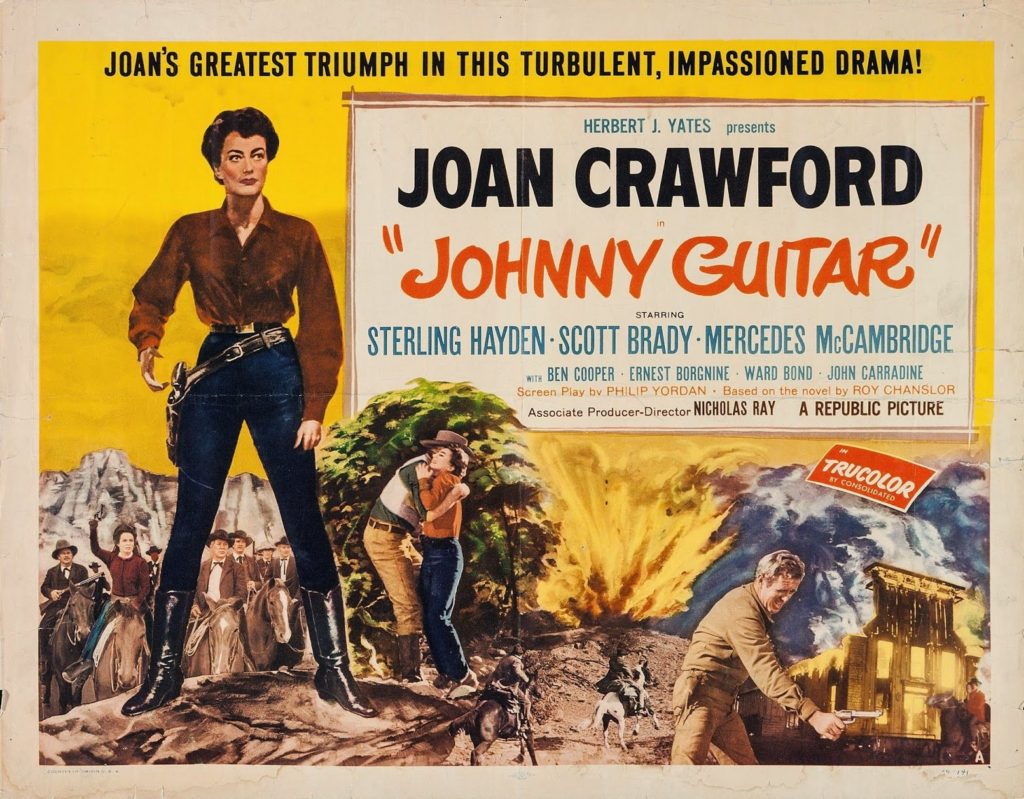★★★½
“When a fire burns itself out, all you have left is ashes.”
 Despite the male-oriented title, there’s no doubt who the star is: Vienna (Crawford), a former saloon girl who has clawed her way up to owning her own place, on the outskirts of an Arizona mining town. She has inside knowledge of the route the railroad is going to take, and chose her location with that in mind. But there’s stiff local opposition, from those who don’t want the railroad, or who object to her allowing the Dancing Kid (Brady) and his gang, suspects in a stagecoach robbery, to frequent her establishment. Leading those with a dim view of Vienna, is Emma Small (McCambridge), whose brother was killed in the robbery.
Despite the male-oriented title, there’s no doubt who the star is: Vienna (Crawford), a former saloon girl who has clawed her way up to owning her own place, on the outskirts of an Arizona mining town. She has inside knowledge of the route the railroad is going to take, and chose her location with that in mind. But there’s stiff local opposition, from those who don’t want the railroad, or who object to her allowing the Dancing Kid (Brady) and his gang, suspects in a stagecoach robbery, to frequent her establishment. Leading those with a dim view of Vienna, is Emma Small (McCambridge), whose brother was killed in the robbery.
Vienna hires her former lover, who goes by the name of “Johnny Guitar” (Hayden) as security, only to be given 24 hours to get out of town by Emma and the disgruntled townsfolk. Matters aren’t helped when the Dancing Kid and his crew raid a local bank. A posse sets out to track them down, and Emma convinces the town-folk that Vienna – unfortunately in the bank at that point – was complicit in the Kid’s crime. The presence of Turkey, a wounded member of the gang who is hiding out in the saloon, doesn’t improve Vienna’s situation.
Crawford is magnificent, utterly commanding the screen with a blistering performance, despite off-screen issues between Crawford and other cast members – a situation not helped by McCambridge’s alcoholism at the time. But she wasn’t alone, Hayden infamously saying afterward, “There is not enough money in Hollywood to lure me into making another picture with Joan Crawford. And I like money.” However, it could perhaps have been worse: the director originally wanted Bette Davis for the role of Emma, but couldn’t afford her. Given subsequent events when Davis and Crawford starred together in What Ever Happened to Baby Jane?, Ray probably dodged a bullet.
Made in 1954, this is a not very disguised parable about McCarthyism and mob psychology: credited writer Philip Yordan often lent his name out to blacklisted colleagues, reportedly Ben Maddow in this case. For example, the Dancing Kid is innocent of the crime of which he’s accused, and driven to commit one as a result – he needs funds to get out of town and escape the lynch-mob. But it’s the scene where Turkey is interrogated by the mob and forced to implicate Vienna, which is the most obvious jab at the then-contemporary political situation. Perhaps the resistance to the railroad is also a metaphor for reactionary conservatism?
This is all largely secondary in terms of modern entertainment, especially when you can watch Vienna spitting out lines like, “Down there I sell whiskey and cards. All you can buy up these stairs is a bullet in the head. Now, which do you want?” In less confident hands, these could easily seem cheesy: in Crawford’s, they become an entirely credible threat. Vienna is a rare character, not only for the genre or the era, but also for her age. The tired veteran gunfighter who simply wants a peaceful life is a common Western trope; it’s just rarely if ever a middle-aged woman. Crawford was 49 at the time of its release, and there’s little or no attempt to play her as younger.
She’s so good, everyone else pales in comparison – and that’s a cast which includes the likes of Ernest Borgnine and John Carradine. Hayden and, particularly, Brady come over as bland, and their subplots are nowhere near as interesting. It’s possible they may simply have been necessary for the fifties, which could have been more than slightly unwilling to tolerate a film with a gun-toting fallen woman as the heroine. As she says, in another great speech, “A man can lie, steal and even kill. But as long as he hangs on to his pride, he’s still a man. All a woman has to do is slip – once. And she’s a tramp!” Tramp or not, she’s still capable of being the most fascinating character in a compelling tale which has, largely, stood the test of time well.
Dir: Nicholas Ray
Star: Joan Crawford, Sterling Hayden, Mercedes McCambridge, Scott Brady





